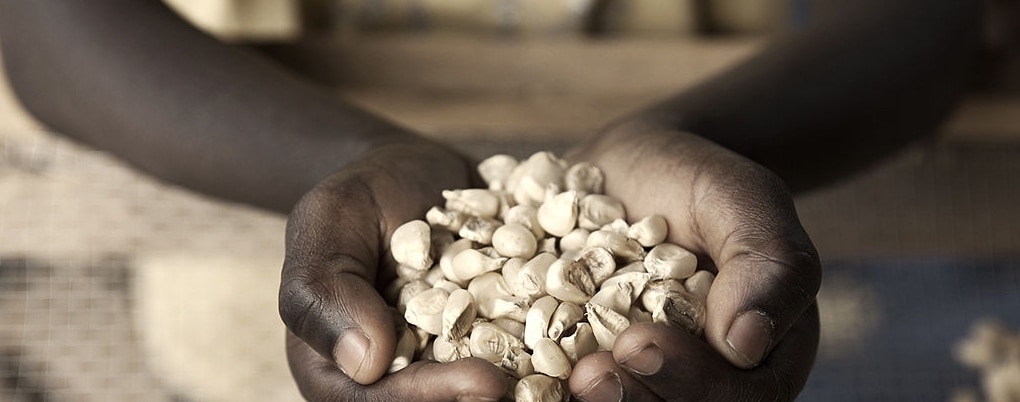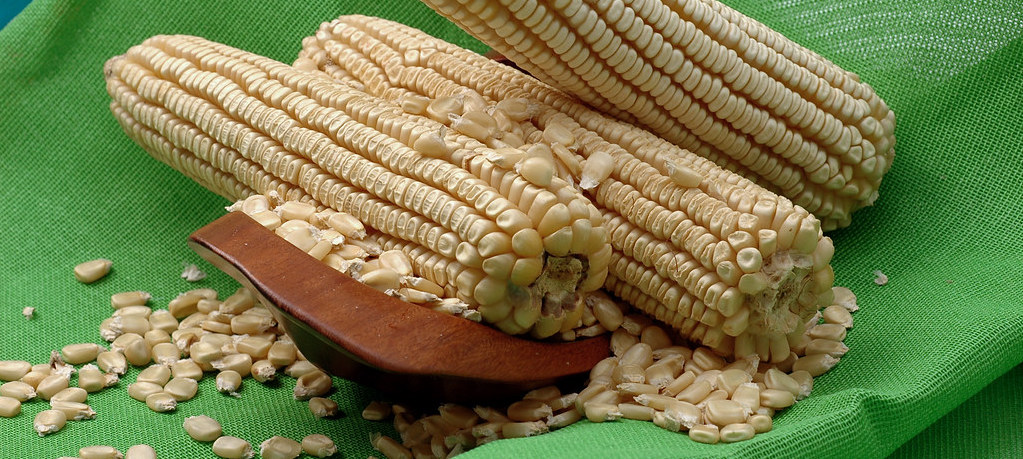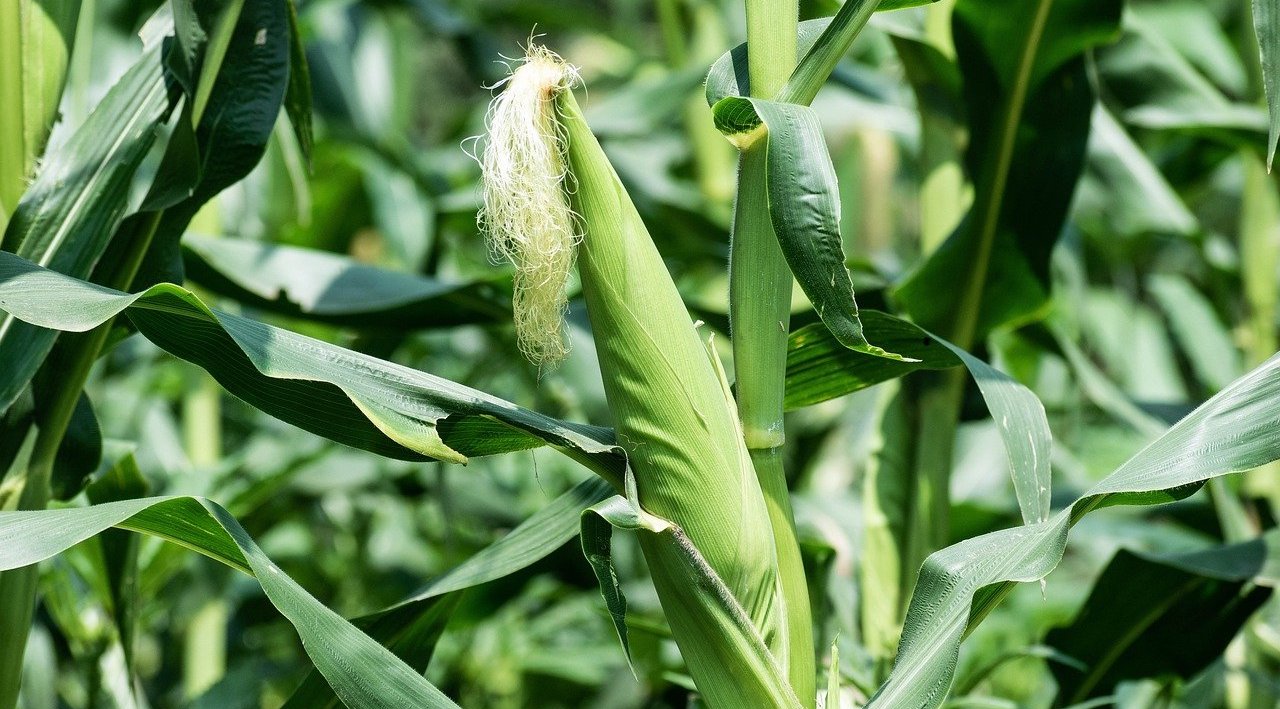Winfred Mwoka, a beneficiary of regenerative agriculture project shows off her bumper harvest after adopting RA practices and technologies. Photo: CGA
Poor Farming Methods
For 34-year-old Winfred Mwoka, farming in her a half an acre farm in Miavini village, Kaiti Constituency, Makueni County is her passion. While the young agropreneur had the dedication and even the land, he lacked the tools, training, and knowledge necessary to thrive as a farmer. All of this changed when he began receiving support from AGRA’s Scaling Out Regenerative Agriculture Practices in eastern Kenya.
Mwoka a mother of two children says the use of uncertified seeds, conventional farming methods, lack of capital to purchase fertilizer and till her farm has negatively affected her farm yields. She barely harvests anything from her farm although she puts a lot of effort. Mwoka says poor farming practice contributes to low productivity; an experience she has experienced in previous years.
Village Based Advisors (VBAs) Intervention
However, her farming experience changed, thanks to Regenerative Agriculture project though the sustainable Village Based Advisors (VBAs) model, an initiative supported by the Alliance for a Green Revolution in Africa (AGRA) and implemented by Cereal Growers Association (CGA) and other partners to improve food security, community and resilient ecosystems through adoption of regenerative agricultural practices and technologies among smallholder farmers.
Mwoka says the knowledge and skills shared by Daniel Munene, a VBA helped her to adopt better farming practices that improved her yields and productivity optimally.
“I used to harvest 3 – 4 bags of maize in my piece of land. Today, I harvest 8 bags. This is two times what I used to get previously”. Mwoka says.
Regenerative Agriculture
Since September 2020, Mwoka was trained by a VBA on Regenerative Agriculture (RA) and climate smart agriculture (CSA) practices and technologies. The RA technique is a dynamic and holistic way of farming that involves all the principals of permaculture and organic farming, such as minimum tillage, use of cover crops, crop rotation, Intercropping, agroforestry, use of organic manure, mulching to keep the soils moist, and use of soil and water conservation structures such as terracing to reduce soil erosion, use of basins to preserve soil moisture and the use of composted manure to give the topsoil the texture of a fertile land.
“When Regenerative Agriculture was introduced to us, it was a major breakthrough. The knowledge and skills we were taught made farming easy and enjoyable.” says Mwoka.
Mwoka used the knowledge and skills received on Regenerative Agriculture on her farm. She adopted RA practices such as minimum tillage, use of organic manure, mulching, agroforestry, intercropping and use of soil and water conservation structures such as terraces.
“I was also taught on the right spacing, use of certified seeds,” Mwoka added.
Mwoka used the knowledge and skills she learned on Regenerative Agriculture on her farm and observed major improvements on her yields.
“Before learning about Regenerative Agriculture and going through the training, I used to harvest 3 – 4 bags of maize from my piece of land. But after the training, my yield doubled. In the previous season, I harvested 8 bags of maize. Regenerative Agriculture has immensely increased the production of my farm.” Mwoka said.
Demo plots positively contributes to better farming
To ensure farmers are receptive to farming practices on demonstration plots their results are compared to those of plots where conventional farming practices is applied. The conventional farming practices have lower production. That makes it easier to convince farmers to adopt the new practices incorporating regenerative agriculture practices.
Elijah Maithya Thomas, a CGA Agribusiness Coordinator in Kibwezi West confirms the importance of learning through observation and participation through demo plots.
“We brought farmers together and established demo’s on plots of 5 by 5”, he says.
The goal for the demos is to ensure farmers apply what they have learnt from the VBAs in terms of Regenerative Agriculture. This has immensely improved farm output to a greater extent.
Links to value chain actors
Apart from training farmers on best farming practices, VBAs have linked farmers with value chain actors such as input suppliers, input suppliers, output buyers, supportive service providers, Hermetic Storage Technology (HST) providers and other key value chain actors. In some instances, the VBAs provided certified seeds and fertilizers to the farmers.
“The VBA always visit us on a regular basis to find out the progress made, answers our questions and concerns. He also linked us with certified seed and fertilizer suppliers,” Mwoka said.
Access to markets
According to Mwoka, they have not only benefited from key farming lessons taught through Regenerative Agriculture project, they have been assisted to find the right market for their farm produce and this has impacted her income.
“From the 8 bags of maize I managed to harvest the previous season, I sold 4 bags and bought housing construction materials and managed to roof my house. I also started rearing chicken and from it, I am able to make extra money.
Practicing Regenerative Agriculture has doubled her production. Thanks to CGA, its partners and the contribution of Village Based Advisors.
Knowledge Exchange
Mwoka confesses since she adopted regenerative agriculture and climate smart agriculture practices and technologies, her farm yields improved immensely and doubled her revenue.
Her bumper harvest captured the attention of her neighbors and other villagers who started to make in-roads to her farm to learn from her experience, what she has done to improve her farms productivity and how she can help them.
“The whole village is also benefiting from the knowledge and skills I have acquired from regenerative agriculture project. The villagers visit my farm and I share with them what I have done to increase my farm yield. I am happy that farming is finally paying,” says Mwoka.
The use of regenerative agriculture and climate smart agriculture practices and technologies and the support offered through the sustainable Village Based Advisors model to farmers in Makueni County, Mwoka being one of them has transformed farming through improved farm yields, better prices for farm produce due to linkages with the right markets.






